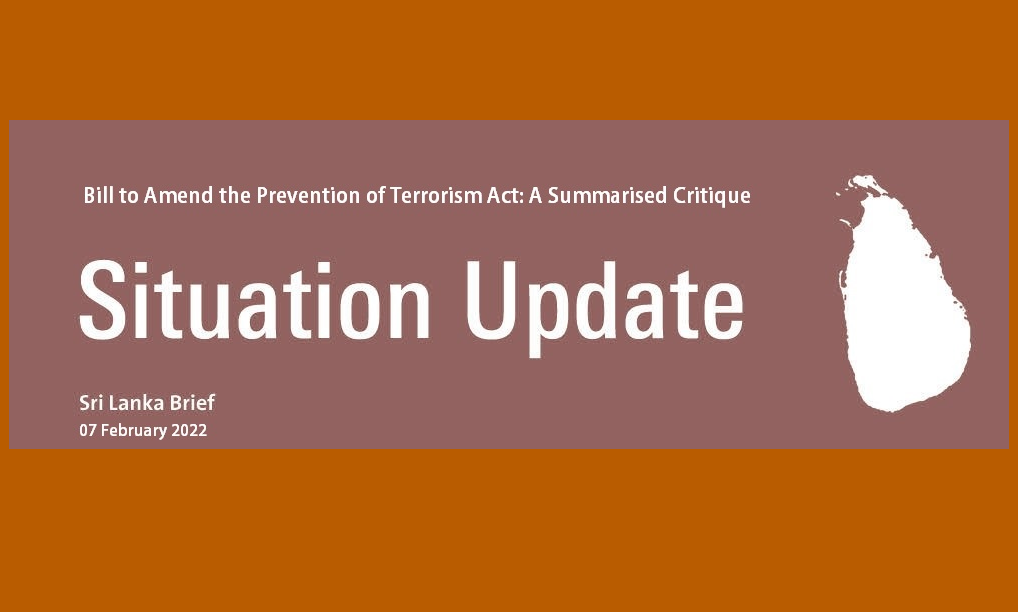Sri Lanka Brief Update 07 February 2022
Bill to Amend the Prevention of Terrorism Act (PTA): A Summarised Critique
- 1. In December 2021 in a joint communication UN experts published five benchmarks to consider in any amendments to PTA. The gazetted amendments do not comply with any of those benchmarks.
UN experts called for information of how the planned or in process amendments will comply with international obligations, including the benchmarks highlighted in this communication, specifically ensuring that any amendments:
a)Employ definitions of terrorism that comply with international norms;
b) Ensure precision and legal certainty, especially when legislation may impact the rights of freedom of expression, opinion, association and religion or belief;
c) Institute provisions and measures to prevent and halt arbitrary deprivation of liberty;
d) Ensure preventive measures are in place to prevent torture and enforced disappearance and adhere to their absolute prohibition; and
e) Enable overarching due process and fair trial guarantees, including judicial oversight and access to legal counsel
Number of critical assessments made by concerned citizens and institutions shows that none of these quires have been addressed by the amending Bill.
- The definition of terrorism remains unchanged. As it stands, section 2(h) of the PTA permits arrest of any person whose speech, writings, signs, or visible representations “causes or intends to cause commission of acts of violence or religious, racial or communal disharmony or feelings of ill-will or hostility between different communities or racial or religious groups.” (Mytili Bala /California attorney) The definition of the acts which fall within the offence of terrorism is of a broad and vague nature and has allowed the PTA to be used even in instances where its use is not warranted. This has not been addressed by the amendments. (CPA)
- The amending Bill does not address problems with the admissibility of statements and confessions under the PTA. The provisions of the PTA waive the application of the Evidence Ordinance and there are no safeguards to be followed in recording confessions and statements from suspects. The period of 72 hours after arrest and before production before a magistrate has not been amended. This is a loophole in the PTA which facilitates the torture of those arrested under the PTA while in custody. (CPA) What’s more, the Bill maintains blanket immunity under section 26 of the PTA for claims “against any officer or person for any act or thing in good faith done or purported to be done in pursuance or supposed pursuance of an Order made or direction given under this Act.” (Mytili Bala /California attorney)
- 4. The proposed amendment allowing the Court of Appeal to grant bail only if the trial had not commenced can be argued as limiting even the existing powers of the Court of Appeal and also as an attempt to remove the judicial discretion that the original courts ought to exercise when a suspect is produced before a Magistrate. In addition, for the first time in Sri Lanka’s judicial history a bail approved by the Court of Appeal under the new proposed provision, section 15 B, can be ignored and in effect overruled by a lower Court, namely the High Court which can remand the suspect under the first proviso to section 15 B until the conclusion of the trial, even in cases where Court of Appeal has approved bail. (M. Zuhair.PC)
- Clause 2 of the proposed amendments claims to address this deficiency by reducing the aggregate period of detention from 18 to 12 months. Clause 10 would provide that a person remanded or detained for 12 months is entitled to seek bail. These amendments do not in any way address the fundamental violation, as they still allow for persons to be deprived of liberty for an entire year without being given the opportunity to be heard before a court of law. Furthermore, subsection 2 of clause 10 allows enforcement authorities to obtain an order from the High Court to keep suspects in remand custody until the end of the trial. (ICJ)
6.The proposed amendments also fail to deal with Section 16 of the PTA relating to the admissibility of “confessions”, in direct contravention of ordinary rules of evidence as it shifts the burden of proof of coercion on to the accused. (ICJ) These statements at times recorded by Magistrates and more often by police officers above the rank of Assistant Superintendent of Police (ASPs) take place while the physical security of the suspects remains under the exclusive control of the police. Suspects remain in State control, both before as well as after the statements are recorded, when suspects are under total fear of reprisals if statements are not given in the manner tailor-made by the police. (M.M. Zuhair.PC)
- Section 6 of the PTA gives extensive powers of search and seizure. The implementation of these measures relating to search and seizure should be professional and transparent and subject to oversight and judicial scrutiny. The amendment fails to address this.
- The lack of judicial oversight during investigations has not been addressed by the amendments. The extensive powers granted to investigating officers including to take suspects from place to place, creates space for the continued violation of their rights as many reported being subjected to torture during such periods of being taken out of prison for interrogation. (CPA) Section 7(3), which allows a person to be taken out of judicial custody to any other place for investigation, and Section 15A which empowers the Secretary, Ministry of Defence, to determine a person’s place of detention even after the person is remanded also remain. (Joint statement. To be published)
